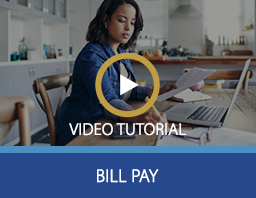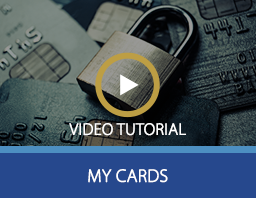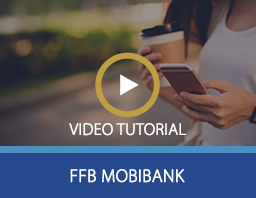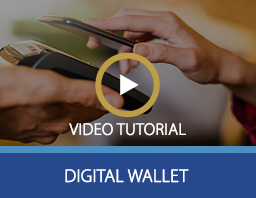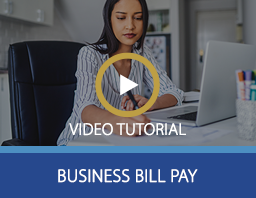Education Resources
Annual Credit Report
This is the ONLY authorized source to get your free annual credit report under federal law. The Fair Credit Reporting Act guarantees you access to a free credit report from each of the three nationwide reporting agencies – Experian, Equifax, and TransUnion – every twelve months. You can request your free report online, by phone or by mail. Visit the website, call 1 (877) 322-8228, or fill out the Annual Credit Report Request form and mail it to Annual Credit Report Request Service, PO Box 105281, Atlanta, GA 30348-5281.
Get Your Annual Credit Report
ID Theft
This is the Federal Trade Commission’s Identity Theft Website.
Visit FTC
Common Online Scams
This site is a useful learning tool to increase awareness of common online scams. Please take a minute to become more familiar, as well as protect yourself and your family.
Visit OnGuard
Building Wealth
Building Wealth program from the Dallas Federal Reserve for youth financial education.
Visit Building Wealth
My Money
This website was created by the congressionally chartered Federal Financial Literacy and Education Commission. It provides information, games and fun facts about money, savings and planning for the future. Teachers and educators can also find curricula, lesson plans, tip sheets and other tools for teaching financial capability.
Visit My Money
Corporate Customer Training
Please review our handout on Cybersecurity and Corporate Account Takeover (CATO). Click the button below for an informative video from the Louisiana Bankers Association.
Cybersecurity & Cato Video
Types of Fraud
Phishing
Phishing is a method developed by scammers and hackers to get innocent victims to reveal their personal information. Phishing is a leading factor in the rise of identity theft. The most common method of phishing involves skillfully designed emails which claim to be from a reputable company with whom the recipient may or may not have a relationship. The email may request the recipient to confirm personal information such as your access IDs, passwords, account numbers, etc. The email may instruct you to update or confirm your personal information by responding to the email or by directing you to a fake website that looks like a legitimate website. Be cautious if you receive an email that appears to have been sent by First Federal Bank.
Vishing
A variation of phishing is vishing, in which you receive an email supposedly from a reputable source with an urgent request for you to call a phone number. You are then asked to provide sensitive information either by voice or entering on the keypad. Do not call the number. Instead, contact First Federal Bank immediately at (337) 421-1200.
First Federal Bank will never:
- Send emails requesting personal information including Online Banking passwords
- Send emails requesting to verify account activity
- Send emails claiming to restrict your account or card if personal information is not provided
If you believe you have received a suspicious email from an individual posing as First Federal Bank, please forward it to firstfederal@ffbla.bank so we may verify if it is valid.
Smishing
The most common method of smishing involves skillfully designed text messages that claim to be from a reputable source with which the recipient may or may not have a relationship. The text message may request the recipient to confirm personal information such as your access IDs, passwords, account numbers, etc. The text message may instruct you to update or confirm your personal information by responding to the message or by directing you to a fake website that looks like a legitimate website. Be cautious if you receive a text message that appears to have been sent by First Federal Bank. Make sure you are familiar with the mobile communications of the sources that you allow to send you messages.
Spyware & Malware
Spyware and Malware are programs that can be loaded onto your computer without your knowledge. Spyware disguises itself as a legitimate application and embeds itself into your computer to monitor your activity and collect information. Malware contains viruses, Trojan horses or other types of malicious code designed to steal personal information. Spyware and Malware are both serious threats to the security of your computer and can be spread through email, website, test messages and more.
- Do not open emails, attachments or links from a source that you do not know or trust.
- Keep your antivirus software updated. Ensure that your antivirus software also includes anti-malware software.
- Be aware of unexpected pop-up boxes requesting personal information. Your computer may be infected with malware by a hacker that is trying to obtain your personal information.
Please be aware that legitimate calls from First Federal Bank Fraud Prevention group are made on a normal basis. The agents will only ask for confirmation of certain transactions on your debit card and sensitive personal information is not requested. The card alert retrieval number is (877) 253-8964.
Fraud Safety Tips
When banking online, it is important to protect yourself. The Internet offers the potential for safe, convenient new ways to conduct your banking business, any day, any time. Safe banking online involves making good choices that will help you avoid costly surprises or scams. Here are a few tips to protect your personal information.
- Create a password that is easy for you to remember, but that would be hard for someone to guess. Our system will allow you to create a password with up to 16 characters and must include a minimum of two numbers.
- Never share your access ID or password information with anyone. First Federal Bank will never call or email you requesting personal information including your Online Banking password. There is no reason for anyone else to know your password.
- Change your passwords often. We recommend that you change your password every 60 to 90 days.
- Install reputable antivirus software on the computer that is used to access your financial information.
- Only access your online banking from a trustworthy computer. Shared computers located in airports, cafes, libraries and hotels may be exposed to malicious software or viruses that may log your key strokes or steal your password.
- Register to receive Online Banking alerts. These alerts can help you determine if fraud has occurred on your account.
- Sign up to receive your statements online. Stopping your paper statements will reduce the likelihood of mail fraud.
- Monitor your bank accounts and check for suspicious activity for debits, credits and new bill payees that you do not recognize.
- Don’t open emails, attachments or links from an unknown source.
- Take advantage of any security settings on your mobile device.
- Do not store personal or account information on your mobile device.
|
How to Report Fraud
If you are worried that you may be a victim of fraud, it is important that you let us know immediately.
Contact us if you suspect your Online Banking access ID or password, credit card or debit card, or personal information such as your Social Security Number or account number have been compromised.
Report by phone:
(800) 860-1238
(337) 421-1200
Report by email:
If you prefer to contact us electronically, you may send an email to firstfederal@ffbla.bank and include your name and phone number so that we may contact you.
You may also speak with a live representative during regular business hours using the Secure Online Chat located within Online Banking.
Report by mail:
You may write to us at First Federal Bank of Louisiana, PO Drawer 1667, Lake Charles LA 70602-1667. Include your name and account number and explain why you believe your information has been compromised. We suggest that you contact us by telephone if there has been an electronic funds transfer from your account made without your permission. This is the best way of keeping your possible losses down.
Notify local police:
It is important that you notify your local police department to file a report. Request a copy of the report or report number for your records. You may also have to include this with any affidavits.
Notify Credit Bureaus:
If you believe you have been a victim of identity theft, it is highly recommended that you contact the three national consumer reporting agencies. Each agency can place a “fraud alert” on your credit report.
Equifax
(800) 525-6285 |
Experian
(888) 397-3742 |
Transunion
(800) 680-7289 |
|
FAQs
We have included on this page answers to some of the Frequently Asked Questions we have received about Phishing and Online Security.
Q. What protection do I have if I have responded to a phishing attempt?
A. Every situation is different. First Federal Bank will work with you to make the best decisions based on the nature of the compromise and what information you have shared.
Q. How do I know if I am at First Federal Bank’s site?
A. Always open a browser window and type in the full address to the site instead of relying on a link provided in an email message. When you attempt to log in to your account, you will be able to recognize an image that you selected, along with your unique authentication pass-phrase. If you do not receive your image or the image is not the one you chose, do not proceed.
Q. What should I do if I am suspicious of an email that has the First Federal Bank logo?
A. Do not reply to, click on, or enter any information into the email. If it says it is from First Federal Bank and you are suspicious, you may forward it to firstfederal@ffbla.bank for review. If you have entered personal information or information about your First Federal Bank account, call us immediately.
Q. Should I ever provide my User ID, Password or any personal information in an email?
A. No. You should not enter your information in an email if you did not initiate the contact.
Q. What do fraudulent emails look like?
A. Most contain a recognizable name, logo and web design of a financial institution. Most are very similar in that they are short, demanding, and contain grammatical errors.
Q. I am not a customer of First Federal Bank, but I received an email about my First Federal Bank account. How does this happen?
A. Phishers send out scams to victimize the general public. First Federal Bank is not the only financial institution that is experiencing these phishing attacks. First Federal Bank and our customers are not being targeted. These scams are being directed to members of the general public with the scammers knowing that a small percentage of recipients will be members or customers of the financial institution that is being phished.
Q. What is Identity Theft?
A. Identity Theft happens when a criminal obtains your personal information to steal money from your accounts, apply for credit cards or loans and other crimes with your identity. Identity Theft can damage your credit and leave you with unwanted bills and frustration to clear your name.
Q. How can I find out if my identity was stolen?
A. It is best to monitor your accounts each month and check your credit report on a regular basis. If you check your credit report regularly, you may be able to limit any damage caused by Identity Theft.
Q. What does First Federal Bank do to keep my information secure?
A. Our Privacy Notice explains some of what First Federal Bank does to keep your information secure.
Q. Is it safe to continue using Online Banking?
A. Yes. First Federal Bank is committed to providing you a safe and convenient way to manage your money. Using Online Banking often is one of the best tools to monitor your accounts at any time. To ensure the security of your account information, Online Banking uses 128-bit SSL encryption. To help protect your privacy, we will sign you out of the Online Banking system after 15 minutes of inactivity.
Q. What does SSL mean?
A. SSL stands for Secure Socket Layer. This allows Online Banking users to establish a secure session, meaning they have minimal risk of external violation. Once inside the Online Banking site, you are secure through our use of SSL technology.
|
Errors and Information Request on Residential, Consumer and Commercial Loan Servicing
If you feel First Federal Bank of Louisiana has made an error in the servicing of your loan or you need additional information, please contact us using one of the following methods:
By Mail:
First Federal Bank of Louisiana
Attn: Loan Servicing Department
P. O. BOX 1667
Lake Charles LA 70602
By Phone:
You may contact the Loan Servicing Department directly at (337) 421-1140, Monday - Friday, during the hours of 8 am to 5 pm (CST).
Please include the following information:
- Full Name
- Contact Phone Number
- Loan Account Number
- Explanation of Complaint or Question
- Any names of First Federal representatives you may have spoken with
|

